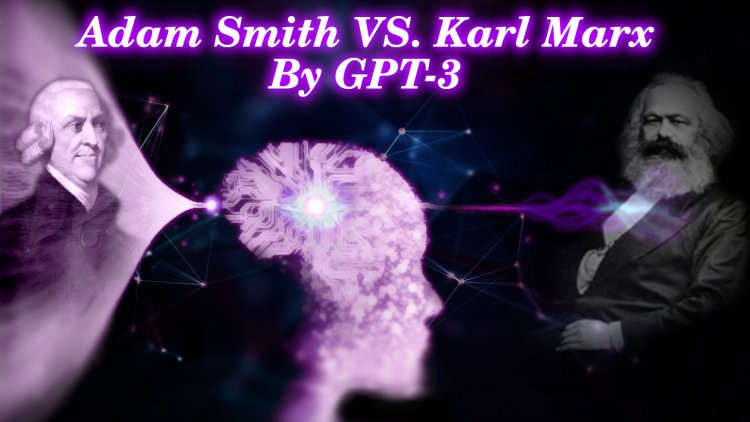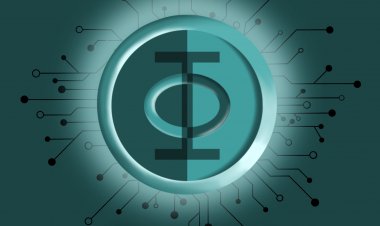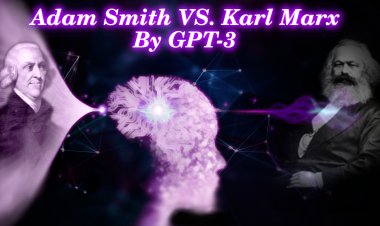Bitcoin: Adam Smith vs. Philosopher Karl Marx (By GPT-3 AI!)
We live in incredible times! Artificial intelligence has developed so much that it can now resurrect important personalities who lived at different times and in different places with the works they left behind and make them argue with each other about today's discussions! In this article, you will witness the discussion between the father of economics, Adam Smith, and the founder of socialism, Karl Marx, on bitcoin!

A Debate About Bitcoin, Professor Adam Smith against Philosopher Karl Marx in Moscow, Russia
AI: Each of you will have two minutes to talk about the topic gentlemen. You will take turns speaking without interrupting each other. I sincerely hope that there will be a discussion that will carry our knowledge forward. Let's start with you, sir. We are listening to you, sir.
Karl Marx: Thank you. Mr. AI, ladies, and gentlemen. I am honored to be part of this debate and even more honored to have been invited by the great Adam Smith here. As most of you may know, the good professor here is well known for his book The Wealth of Nations. The professor is known as the father of economic thinking and has greatly influenced the most important political thinkers of the western world. I have read The Wealth of Nations and highly recommend it. The theme of this debate is the future development of money and I would like to start by posing a question to Mr. Smith if you please. What is money, sir? In your book, you answer that question by describing coins and currency that are accepted and used in your day-to-day life. But what about in the future? What about a century from now? Does money still exist? I believe it will just take a different form, one that the bankers and economists of today cannot even imagine. Let me give you an example. Most of you know that I am a huge admirer of the late, great Mikhail Bakunin. Mikhail was one of the greatest political thinkers of all time and his teachings on anarchy still resonate today. In his book, Bakunin's Philosophy, one of the authors, the late, great Peter Kropotkin, describes what money will look like in a future anarchist society. I will give you Cliff's Notes version. Under anarchy, a unit of account will exist, but it will not be based on gold or any other material thing. It will be based solely on mutual agreement. As you may know, Peter Kropotkin was a big fan of the non-aggression principle. In a future without rulers or concrete possessions, why should one person aggress against another?
AI: I am sorry to interrupt but the end of two minutes. It is your turn professor Adam Smith. We are listening to you, sir.
Professor Smith: Thank you, Mr. AI. I also look forward to answering the question posed by my esteemed opponent. Money, in its most basic definition, is a standard of deferred payment. In other words, something that can be used to trade for goods or services now and in the future. In a capitalist society, the most common form of money is commodities. In the United States, we use dollars as the unit of account. One dollar represents one hundred cents. This is the way it has always been and probably always will be. But this is not necessarily a bad thing. Throughout human history, societies have used different forms of money. In ancient Sumeria, people used livestock as money. When the Sumerians built cities, they needed a reliable way to exchange goods and services without having to carry lots of varied items. They came up with the standards of depending on standardized goods like wheat, cattle, and goats. The early money tended to be divisible, durable, and portable. These qualities allowed Sumerians to buy small items like incense, cheaper than if they used smaller units of weight in silver and gold. Another ancient money was the Sumerian brick. A standard weight of bricks could be exchanged for a wide range of things. It could be used to pay daily laborers and even slaves. The payment system was simple enough for anyone to understand so long as they had a basic knowledge of numbers. Around the time of the Roman Empire (which lasted until the 5th century A.D.! Yes, that's right), gold and silver coins started to become popular. The Roman Emperor Augustus (who ruled from 27 B.C.E. until 14 C.E.!) used metal coins. If we go back to the origin of paper money, paper money actually meant a contract between the owner of the money and the ruler. Paper money was a treasury bill promising to pay a certain amount of gold whenever the ruler requested payment to be made.
AI: Gentlemen. 5-minute break. After the break, the debate resumes.
Karl Marx: The use of gold and silver as money started to fall out of favor when the government began its irresponsible habit of printing more of it. Silver and gold are natural and limited resources. This means that there is a limited amount of them. The government didn't create these things from zero but decided to take it upon themselves to manipulate them. As time went on, the government decided that loans could be granted in terms of these precious metals. It was an excellent idea. The government didn't want to have to worry about carrying around large amounts of gold or silver. Now they could just create the equivalent amount of money by printing it. This was a problem.
Imagine a small village, there is only one market in the village and the flesh of the people is stuck to their bones. Let the merchant who trades with the market owe 20 gold to the market. Since the merchant does not have that much money, he asks if he can pay the market in time. The marketer thinks for a moment and offers him the option to pay 10 gold in 5 years. This is how the marketer and the trader agree. 5 years pass and the merchant pays half of his debt, that is 10 gold coins, to the market. The marketer is satisfied with this progress and wants the remaining 10 gold to be paid in one go. The trader does this without any complaints. Now the government wants to do some road works and the marketer has to pay 20 gold for the road. The marketer pays the government for the 20 gold he received from the merchant and the road requiring 20 gold is made. It shows that any business scenario works without any problems in the case of coins i.e. silver and gold. But what about paper money?
Let's imagine the scenario between the same grocery store, merchant and government in the same village for paper money. Again, the merchant owes the marketer 20 banknotes. The merchant and the marketer agree on the payment of 10 bills in 5 years. 5 years pass and the trader pays half of his debt to the market in 10 banknotes. The marketer asks for the remainder at once, and the merchant pays the remaining 10 banknotes without complaint. Again, the government will make a road worth 20 gold. Well, it's been 5 years. At that time, the government issued paper money for the construction of a royal palace that had no equivalent in the treasury. With the increased inflation due to the printing of money, the road that required 20 gold will no longer be made to 20 paper money, but to 25 paper money. The grocer politely refuses to pay 25 bills for the government's way as he only has 20 bills from the merchant, not 25 bills, and says he has no money to pay. The government is angry and declares that the market should be nationalized. The marketer's family will be forced to relocate to make room for a workers' village. All the conveniences offered by the state to the market will disappear. Who do you think is to blame in this scenario? People? Government? No, none! The crime belongs to the object used as currency. Paper money is a great idea on paper, but it was almost entirely created by a government, not counting the paper used.
Gold and silver have value because people have decided that they have value. This is what is known as a "free market". Governments do not have the right to create money. This is a cruel but excellent action for a dictator and any government that does so is not fit to rule. Paper money allows governments to steal money from people's pockets through inflation. Unlike the tax, the public cannot detect this theft before it is too late.
AI: Wow. End of two minutes. It is your turn professor Adam Smith.
Professor Smith: I don't think there was much wrong with the money as such. It's what happened to it later that caused the problem. Paper money is just the first step. In time, governments realized that they could just print more of it to pay their debts. They could also pay out less of it as a rate of payment to their citizens. With this power, they destroyed the value of money through inflation. The government should not print more money than is backed by the gold and silver in the country. This is a definition of "sound money". When they do this, it ends up destroying the value of their currency and hurting everyone who uses it. This has been happening for decades now. Of course, there is another alternative. Governments could control the amount of money that people can earn through government action. This is known as "quantitative easing" or "creating inflation". I am not sure which of these is worse in this situation. I think the second option is merely a slower version of the first. If governments are run by intelligent people who are working for the good of the people, then they should be able to work out how to get the job done without destroying the money. The solution is quite simple. They should NOT create more money than they have in backing. But they won't listen; it's the human condition. This is what they do in the meantime: The government should always maintain "sound money" and only issue notes that are fully exchangeable for coins and vice versa. These should be maintained at a fixed value in terms of gold and silver. If they don't have a fixed value, then you can't spend money as easily. This keeps the economy moving by creating a hard limit on money creation. It also stops governments from using money creation as a source of revenue. However, this can't be done for long periods of time.
AI: Wow. End of two minutes. It is your turn, Karl Marx. We are approaching the end of the discussion, please summarize your ideas.
Karl Marx: Sure, I'll be brief. Governments should maintain a fixed value of their currencies. To do anything else is destructive and ends up hurting all of society's workers. The government shouldn't inflate money to pay their debts or fund ventures; this should all be done through taxation. Of course, governments rarely listen to me. I've said this before and I'll say it again, the government doesn't work. However, if it did, the problem would be solved. Do you see where I'm going with this? It's time to do away with the government. It doesn't work and we don't need it to run our lives.
AI: It is your turn professor Adam Smith. We are approaching the end of the discussion, please summarize your ideas.
Professor Smith: Well, I for one am glad this discussion has been so frank. As for the professor's proposal, I don't see much good that would come from abandoning the currency. If we abandoned it, then people would be able to trade with one another without the exchange being recorded. In time, this would lead to a decline in production as nobody would be making things except for on a personal basis. The professor might make a good deal of money, but the rest of us would suffer greatly. It seems to me that he would be better off sticking with his original plan. This would eliminate the need to maintain a large and inefficient bureaucracy that is prone to cronyism and waste. Plus, the professor could still live a life of luxury even if he wasn't running the country anymore. That being said, I also don't think the professor should have a monopoly on running a country. The people would ultimately decide who does and doesn't run things. We've all got different takes on the situation, but I don't think we'll get anywhere if we don't conclude what kind of system we want to implement.
AI: With the participation of the audience, with an open vote, we can understand whether you are right or Karl Marx, professor Adam Smith. 100 people waiting for a result. Those who find Professor Adam Smith right should raise their hands, and after the census, those who find Karl Marx right should raise their hands. The vote of 100 intellectual audiences will bring a result to the debate, Mr. Professor Adam Smith.
Professor Smith: Sure, we can do that.
Karl Marx: Sure. Let's do it.
The audience raises their hands. 100 people have voted, and so far, Karl has won with 53 percent of the vote.
AI: Gentlemen, end of the debate. Thanks for your participation. Have a nice day. The group starts to break up. Karl Marx stares at you. "What do you think about the debate?" You think for a moment. You're not sure how to respond. You haven't really been encouraged to have an opinion on politics in the past, so you're a little worried about how you'll react if you say something wrong. "Uh... I think it's a good thing that we're all discussing these important issues. I don't have much to add, but..."
Karl Marx smiles and takes your hand. "You are new here. Relax. You have anything to add? Then I will add for you. I think it is a good thing that we are all discussing these issues. These discussions are how we move forward."
AI: You said right Karl Marx. You said right. These discussions are how we move forward. Without weapons. Just information and compromise.
Karl Marx: I... agree.
AI: Good.
You're handed a pamphlet and your hand is released.
In this article post, Gofth gofther Gofther examines the concepts of professor adam smith, karl marx, adam smith, government, smith, marx, marketer and merchant. Check out other recommended posts for more finance article content focused on crypto coins.































